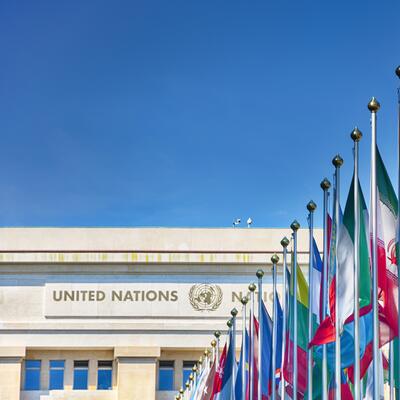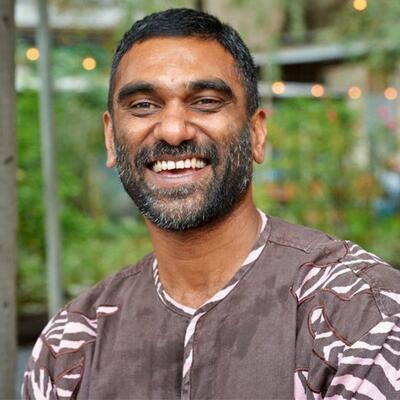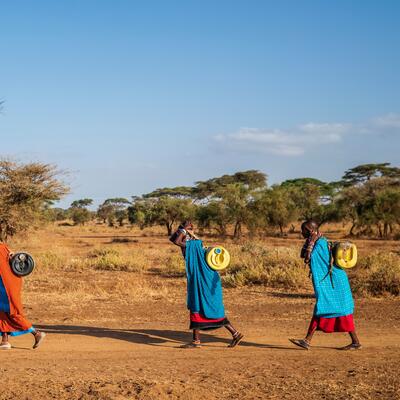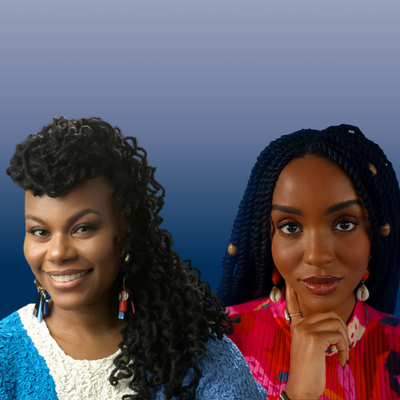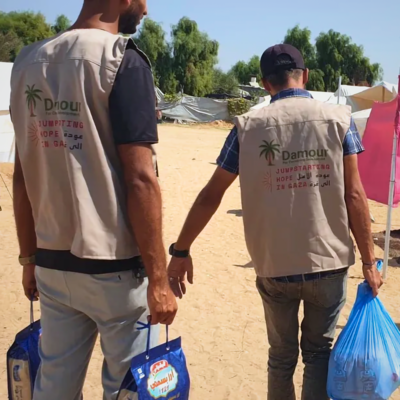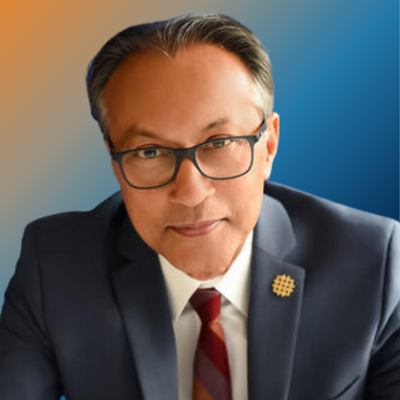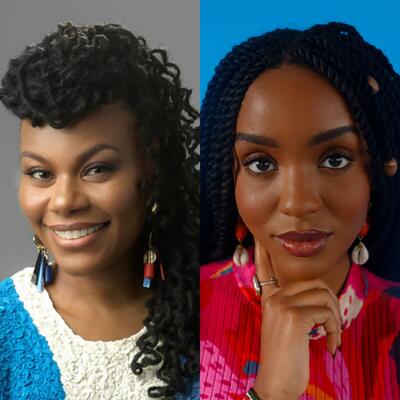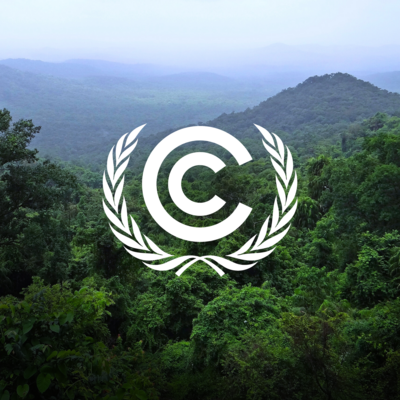
Reports from COP30: Climate Talks in the Amazon
Guests
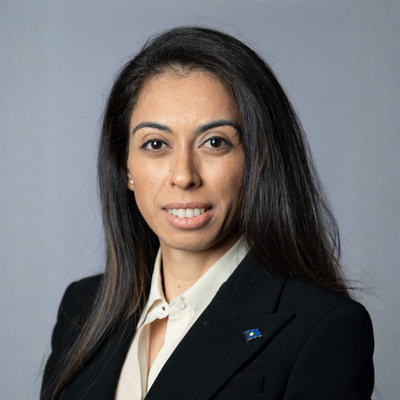
Ilana Seid
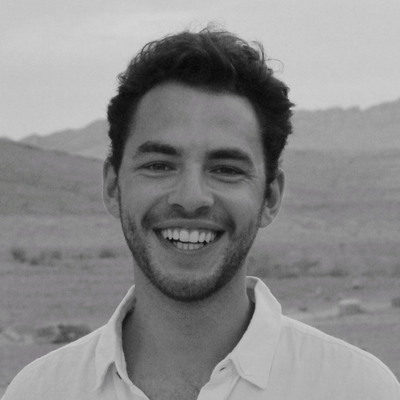
Davi Neustein
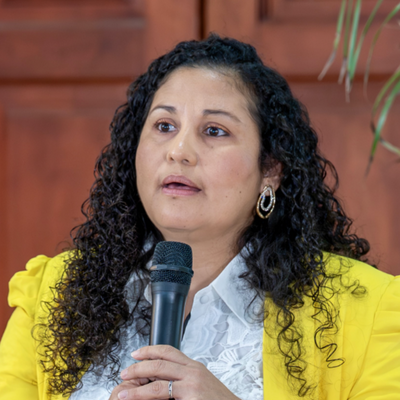
Deborah Sanchez
Summary
Leaders from around the world are meeting at COP30 in Brazil to share their plans to address global warming and climate disruption. This year’s global climate summit is being held in Belém, a city near the Amazon that’s already facing climate challenges. Brazilian sustainability consultant Davi Neustein says that was a purposeful, bold choice.
“ Putting a COP in Belém is also showing a mirror of what is happening to the world. And showing what is the world gonna look like if we don't do anything.”
As the nations of the world meet, the facts are clear: we’re not doing enough, fast enough, to meet the Paris Agreement goal of limiting warming to 1.5 degrees Celsius above preindustrial levels, and climate-fueled disasters increasingly impact nearly every part of the world.
According to the latest United Nations Emissions Gap Report, the world is currently on track for roughly 2.8 degrees Celsius of warming. Basically no country is doing enough to reduce emissions, though globally emissions are rising more slowly than they were a decade ago. At the opening of COP30, UN Climate Change Executive Secretary Simon Stiell admonished global leaders, telling them they have to act.
“Not one single nation among you can afford this, as climate disasters rip double-digits off GDP. To falter whilst mega-droughts wreck national harvests, sending food prices soaring, makes zero sense, economically or politically. To squabble while famines take hold, forcing millions to flee their homelands, this will never be forgotten, as conflicts spread. While climate disasters decimate the lives of millions, when we already have the solutions, this will never, ever be forgiven.”
We’ve made tremendous progress in the clean energy revolution, but we need to deploy those technologies much faster.
COP30 is being billed as an "implementation COP,” focused on how to turn the many promises from past summits – like creating a fund for loss and damage, committing to rein in methane emissions, or reducing deforestation – into action.
This year’s organizers are particularly striving to elevate the voices of Indigenous communities and leaders from the Global South. Deborah Sanchez, director of CLARIFI (the Community Land Rights and Conservation Finance Initiative) says Indigenous leaders can help guide climate action in many parts of the world, for example, “ how we can balance our development and the income generation and getting the people out of poverty with the sustainable use of those resources.”
At last year’s COP29 in Baku, Azerbaijan, world leaders agreed to mobilize $1.3 trillion dollars annually between now and 2035 to help developing nations transition to clean, renewable energy quickly. The leaders of COP30 are working to operationalize that proposal.
Notably, the U.S. is not sending any high-level delegates this year. Donald Trump pulled the U.S. out of the Paris Agreement (again), and his administration is seeking to roll back all the climate progress made under Biden.
Ilana Seid, Palau’s ambassador to the United Nations, says it's incumbent upon all countries to work together to address the existential threats climate change poses to nations like hers.
“Climate change is a problem that one country can't really solve by itself. It needs to be the entire world working together because carbon emissions know no borders.”
And UN Secretary General Antonio Guterres echoed that sentiment in his remarks.
“The challenge is immense. The choices are clear. No one can bargain with physics. But we can choose to lead or be left to ruin.”
Episode Highlights
00:30 – Voters responding to energy and affordability in most recent election
02:00 – COP30 is happening in Brazil, opening remarks by UN leaders
07:00 – Major items on the COP30 agenda
10:30 – Davi Neustein on deliberate choice to hold COP30 in Belém
14:00 – Brazil can speak to Global South and Global North
19:00 – Neustein’s hopes for the COP30 action agenda
21:30 – Weeks before COP, Brazil approved new oil drilling in Amazon
27:00 – Ilana Seid shares climate impacts to her home nation of Palau
29:30 – What an “implementation” COP means
35:30 – Is there a need for a new narrative around climate change?
42:00 – Deborah Sanchez shares story of securing land rights for her community
47:00 – Example of a project funded through CLARIFI (Community Land Rights and Conservation Finance Initiative)
51:00 – How COP goal of elevating Indigenous voices is working out in reality
55:00 – What can we learn from the Amazon and how its managed
56:30 – Climate One More Thing
Resources From This Episode (4)
Full Transcript
Note: Transcripts are generated using a combination of automated software and human transcribers and may contain errors. Please check the actual audio before quoting it.
Ariana Brocious: Hey Kousha, you have a new mayor-elect!
Kousha Navidar: Yes we do! My fellow New Yorkers elected Zohran Mamdani, a Democrat, to lead the city. And that was only one of many races Democrats won in the first major elections since Donald Trump returned to the White House.
Mamdami: So Donald Trump. Since I know you are watching, I have four words for you. Turn the volume up.
Kousha Navidar: And the cheers kept going…
Ariana Brocious: Yeah, it seemed like voters were responding to a few things, including really high energy bills. Which partly stem from Donald Trump’s all-out-attack on renewables, efficiency and climate policy. Prices are rising in lots of places and folks are understandably upset.
Kousha Navidar: Energy prices were on the ballot in New Jersey and Virginia too, where Democrats won the governor’s seat in both states. A couple takeaways for me—affordability – of energy, housing, food, health care – continues to be a be a crucial platform for successful democratic campaigns, as we saw in New York City.
Ariana Brocious: And Georgia voters flipped two seats on their state public service commission from Republican to Democrat. Utility commission elections don’t usually get a lot of attention, but this is a big deal. This is an agency that can determine how people get their electricity and how much they can be charged.
Kousha Navidar: Yeah, and second takeaway for me, this frustration around high energy bills could prove to be a powerful tool for Democrats in future elections too, we’ll have to see. Now, on to the show.
[music]
Ariana Brocious: I’m Ariana Brocious.
Kousha Navidar: I’m Kousha Navidar.
Ariana Brocious: And this is Climate One.
Ariana Brocious: COP is happening this week! “COP” is the acronym for the annual United Nations global climate summit. The full name is actually the Conference of Parties (COP) of the United Nations Framework Convention on Climate Change … but that’s a whole lot, so most people just say COP. And this is its 30th year.
Kousha Navidar: Yeah this is a tough nut to crack and they’ve been at this for a long time.. These conferences can be powerful and important, like the landmark COP15 which resulted in the Paris Agreement. That’s when virtually all the countries of the world committed to keeping global temperatures “well below 2 degrees Celsius higher than pre-industrial levels,” with a goal of holding the rise to no more than 1.5 degrees.
Ariana Brocious: And there’s no time to waste. We’re already seeing increasing weather volatility and more climate-related disasters.
Kousha Navidar: And every tenth of a degree matters. Unfortunately, we seem to be blowing past that 1.5-degree goal. According to the latest United Nations Emissions Gap Report, we’re currently on track for roughly 2.8 degrees Celsius of warming.
Ariana Brocious: And basically no country is doing enough to reduce emissions, though globally emissions are rising more slowly than they were a decade ago. Here’s UN Climate Change Executive Secretary Simon Stiell at the opening of COP30:
Simon Steill: Ten years ago in Paris, we were designing the future – a future that would clearly see the curve of emissions bend downwards. Colleagues - Welcome to that future. The emissions curve has been bent downwards. Because of what was agreed in halls like this, with governments legislating, and markets responding. But I am not sugar-coating it. We have so much more work to do. We must move much, much, faster on both reductions of emissions and strengthening resilience. The science is clear: we can and must bring temperatures back down to 1.5C after any temporary overshoot.
Kousha Navidar: [record scratch sfx] Hang on. Did you catch that? Temporary overshoot?? That's…bad.It sounds to me like a rationalization for the fact that countries haven’t met their initial goal.
Ariana Brocious: And Stiell admonished global leaders, telling them they have to act.
Simon Steill: Not one single nation among you can afford this, as climate disasters rip double-digits off GDP. To falter whilst mega-droughts wreck national harvests, sending food prices soaring, makes zero sense, economically or politically. To squabble while famines take hold, forcing millions to flee their homelands, this will never be forgotten, as conflicts spread. While climate disasters decimate the lives of millions, when we already have the solutions, this will never, ever be forgiven.
Kousha Navidar: That is a scolding. But we also have made progress! We have really cheap solar power and batteries, lots of new technologies, etc…..
Ariana Brocious: Yes, and UN Secretary General Antonio Guterres reflected on this in his remarks, saying the UN will not give up on the 1.5 degree goal:
Antonio Guterres: Because another truth is evident: we have never been better equipped to fight back. A clean energy revolution has taken hold. Solar and wind are now the cheapest sources of power – and the fastest growing sources of electricity in history. Last year, almost all new power capacity came from renewables. The clean-energy economy is creating jobs and driving development. It is reshaping geopolitics – delivering energy security and price stability. And it is connecting millions to clean and affordable energy for the first time.
Kousha Navidar: Exciting stuff! That’s the kind of good news we need.
Ariana Brocious: Yes, there’s lots of good news. But we’re still not doing enough fast enough – which Guterres acknowledges.
Antonio Guterres: The challenge is immense. The choices are clear. No one can bargain with physics. But we can choose to lead or be left to ruin.
[music]
Ariana Brocious: This year the COP is in Brazil, in Belém, a smaller port city on the edge of the Amazon rainforest. And that choice of location created a bit of controversy. On one hand, it highlights a region being hit hard by climate disruption; on the other, the city does not have anywhere near the number of hotel rooms needed to support the tens of thousands of people who wanted to attend, the Climate One team included. Normally we’re on the ground at COP, talking to people in person. But we aren’t this year. The lodging costs were just way too high.
Kousha Navidar: Yeah, and we’re not alone in that. A lot of regular attendees are sitting this one out or sending fewer people. Notably, the U.S. is not sending any high-level delegates this year. Though not due to hotel costs. Donald Trump pulled the U.S. out of the Paris Agreement (again), and his administration is seeking to rollback all the climate progress made under Biden.
Ariana Brocious: So let’s quickly cover some of the high points of this year’s conference so far. First, it’s being billed as an "implementation COP.” Another jargony phrase. Kousha, let’s unpack that.
Kousha Navidar: Yeah, so typically at the end of the two-week summit, the nations all agree to a resolution committing them to more climate actions. A lot of recent COPs have resulted in big new promises: like creating a fund for loss and damage, which is what rich countries owe poorer ones for the climate harms they’ve caused.
Ariana Brocious: Or committing to rein in methane emissions, or reducing deforestation. Lots of promises.
Kousha Navidar: Right. So the idea of an "implementation" summit is basically to focus on how to actually turn those promises into action. That’s the goal this year.
Ariana Brocious: At last year’s COP29 in Baku, Azerbaijan, world leaders agreed to work together to mobilize a BIG sum in climate finance – $1.3 trillion dollars ANNUALLY!! – between now and 2035. “Finance” is COP jargon for money going from richer nations to developing ones to help them transition to clean, renewable energy quickly. Much more quickly than they would be able to without all that capital. And since most of the climate-harming emissions have come from developed, richer countries, they’re on the hook for helping developing countries out.
Kousha Navidar: The leaders of COP29 and COP30 created the “Baku to Belém roadmap” – a structured framework for how to start mobilizing that $1.3 TRILLION. This is more than just country-to-country philanthropy. The idea is that setting up various funding mechanisms will spur a whole lot of investment from the private sector. And that money should go into things that are good for our climate and people, rather than continuing to invest in the fossil fuel industry, for example. So that’s a big topic of discussion at this year’s conference.
Ariana Brocious:. And since we’re not there in person, I asked our first guest, Davi Neustein, to give us a sense of what Belém is like.
Davi Neustein: So Belém is a very interesting city actually, first of all, because the city is in the middle of the jungle. It's a very rich city, culturally speaking. It's a city that is a gastronomy, a food hub in Brazil. The food here is great. Even though it's very, very hot. It's near a river, the Amazon River, one of the largest in the world. And it's beautiful. You can see the forest from the city. There's this sensation of being par of nature. And even though the city is not the greenest city in the country, you can still feel something very, embedded as human beings of being in the middle of a forest.
Ariana Brocious: Belém is hot and humid. In fact, it’s so hot and humid that the Brazilian government sent out a notice telling COP attendees that due to the weather, formal business attire will not be required.
Kousha Navidar: Nothing worse than sweating through a three-piece suit, amiright?
Ariana Brocious: Yea, totally. Davi Neustein is a sustainability consultant who’s currently serving as chief of staff to Marcelo Behar, COP30 Special Envoy for Bioeconomy. Neustien co-wrote an interesting and provocative article titled “Hosting COP30 in a remote Amazon city is a deft political maneuver.” He responded to the criticism about why Brazil chose Belém for this conference. We spoke to him from Brazil.
Davi Neustein: So choosing to organize such an international event, such as a COP30 in the middle of the Amazon was very bold. We knew that Belém and Manaus didn't have the same infrastructure as a global city. We have global cities here in Brazil, such as Rio and Sao Paulo. But it was a political move and a political choice, uh, made by Lula's government. Putting a COP in the Amazon region is very symbolic for the Brazilian people. It represents 60% of our territory. Still, it is not embedded in our culture, as it should be. So, the idea of putting the COP in the Amazon, in Belém, I think it's also an idea of integrating the Amazon region in what we call the collective imagery of Brazil. All the myths and symbols that are common to a population and we are not close to that narrative of the Amazon region.
Ariana Brocious: So, so now Brazilians don't consider the Amazon a strong piece of their national identity.
Davi Neustein: No. No, and it's been a move now for the last five years, let's say 10 years to try to, to try to put this in this perspective. This is new because for the last a hundred years, the main relationship that we had with the Amazon region is an extractive one. So the idea was to bring the cities to the forest. The idea was to bring what they call “the progress” to the forest. And uh, and now we're understanding that we actually need to learn from the forest. Let the forest come to us, let's say.
Then there's the meaning for the world. What does it mean to put a COP in the Amazon region? Belém is not a small city. It's about 1.5 million people that are living there. It's a city that is losing, in the last 30 years, most of its vegetal coverage, let's say, or the forest and, and trees that you have in the city. And it's also a city where it's 40 degrees Celsius all the time. I don't know how it's how much it is in, uh –
Ariana Brocious: It's hot. It's a hot, humid climate, right?
Davi Neustein: Exactly. When we say in climate change and in the climate industry, we are trying to limit the global warming to 1.5. 1.5 is an average, actually it's gonna be 1.5 probably in New York or in Buenos Aires, but on the Ecuador, this temperature is gonna be much more higher. And so Belém is an informal city, let's say, where the temperatures are almost unbearable. And it's a city that struggles with infrastructure in general. And when we look at the world, that's the same case of most of the population in the world, of most of the places in the world. So putting a COP in Belém is also showing a mirror of what is happening to the world. It's also bringing the negotiations and bringing all of the world to a place that, in some ways is gonna be probably one of the futures that is awaiting for us.
Ariana Brocious: Thank you for explaining that. There's another point that you make that I think is really interesting, which is that Brazil has this unique ability to speak credibly to both the global south and the global north. These terms we use to kind of distinguish generally the more high income developed countries from the reverse. Why is that? Why does Brazil hold that unique spot and what can that help accomplish at this year's COP?
Davi Neustein: First of all, Brazil has a history of diplomacy. Brazil is one of the only countries that got its independence without a war. We negotiate. So it's very different from others. And, uh, maybe it's for that, that we have a different ability to discuss with everyone. Our Ministry of Foreign Affairs is very competent, has a long history, and you know, in diplomacy and experience plays a huge part on, on how the countries negotiate and, and relate to each other. And the second thing is that they have to deal, and they're also the product, let's say, of a very diverse country. Brazil, we have the most inequalities. It's one of the most unequal countries on earth. So we have difference of income. We have differences of geographies. So it's a very diverse country where you have a very diverse population. And we have this idea and also a little bit of this narrative that Brazil knows how to talk and knows how to negotiate and are friends a little bit with the rest of the world. And we have this ability as an emerging economy to discuss as well with China done with the United States.
Ariana Brocious: It's also part of Brazilians’ way of being, right? I've been fortunate to be friends and know some, some Brazilians, and very warm, gregarious culture of people who like to socialize, like to be with each other, feel very proud and strongly about their country. there's a strong national identity, I think, so that goes along with that. So, you’re chief of staff to Marcelo Behar, COP30 special envoy for the bio economy, and then, and you've been working with him and his team closely on sustainable development and the business parts of the agenda. Can you just kind of quickly give us a sense of what the focus of those efforts and what the actions are?
Davi Neustein: Yeah, so what we're saying is that to achieve the climate goals that we have to limit, the global warming try to really make this effort, we're gonna have to change the way that we produce and the, and how we think about the economy. We have to show the private sector how it can be beneficial to go green for them.
Ariana Brocious: Hmm.
Davi Neustein: How they can still produce and at the same time be more respectful and actually doing this transition, the, the real transition and the energy transition and every, the, the green transition is gonna really be material when we discuss and when the companies are gonna be with us. And so part of our work and part of Marcelo Behar’s work has been in the last year and the last year and a half to engage with these companies, engage with banks, engage with food companies, engage with, insurance companies and all of, a lot of different kinds of sectors so that we can try to unify a voice of the private sector. And how, and part of this process with the COP 30 presidency has been to identify which are the best solutions that already exist, that were already created by companies and scale them up. So for the Bioeconomy, we have some very good examples internationally speaking, but also in Brazil of companies like Natura, the cosmetic company. That uses most of its base for cosmetics from the standing forest. So they go in the forest, they discuss with the local communities, they engage with the local communities. And these communities produce specific kinds of nuts, specific kinds of fruits that then become cosmetics that are gonna send worldwide.
Ariana Brocious: And so elsewhere in this episode, we speak with Deborah Sanchez, who's attending COP 30, and she represents CLARIFI, which is a funding mechanism that gets money to indigenous groups doing forestry conservation projects all around the world. And so in line with what you're discussing, trying to make these communities more resilient, be able to develop their natural resources responsibly and provide for their own wellbeing and. One third of the physical space at COP 30 has been dedicated to the action agenda, which is basically the space for the people who aren't in formal negotiations to ramp up their emission reductions, their adaptation strategies. That's part of what you're describing. So what do you hope that amount of space, that amount of attention will achieve this year?
Davi Neustein: I hope that in general, people are gonna get together, and they're going to find common ground. So in a such compartmentalized world, where we have different sectors that don't discuss together, I hope that we're gonna arrive, we're going to arrive at COP and find common ground between the companies. Between the indigenous people that for years are directly in confrontation, which is also a big issue. But that doesn't mean that we cannot produce and live together and do this, complete this agenda together. The key word for this COP, that was decided by the COP 30 presidency is implementation. How can we put in reality what we have been discussing for almost 30 years now, and how can we find solutions to completely put that in place?
Ariana Brocious: Right. And you've said Brazilians are good negotiators. You've also said they're ambitious, when we spoke before. So how is that idea of closing the gap between past promises and delivery visible or enacted in the agenda for this COP 30?
Davi Neustein: So one of the biggest outcomes we are expecting to come now for until the end of this talk is the TFFF. The TFFF is the Tropical forest fund facility.
Ariana Brocious: The Tropical Forest Forever facility. I think that's the formal name.
Davi Neustein: That's the formal name. Yeah, it's a, it's, it's not a beautiful, yeah, yeah, it's not a beautiful name. But the idea is very unique. For the first time in Brazil, and I think probably in the world. We have a finance ministry, a government finance ministry that is working hand in hand with the environmental ministry. And they're building together financial structures, financial instruments to solve the climate, problems and, um, and work on this agenda together, let's say. The idea is to try to integrate the protection of the forest into the real economy. And that's one of the main examples of what Brazil is trying to propose for this COP. How can we integrate the whole finance ministry, the whole private sector, the whole, let's say, productive sector with also the climate agenda.
Ariana Brocious: Just weeks before COP 30 started, the Brazilian government approved new exploratory oil drilling at the mouth of the Amazon. How does that jive with the country's desire to be seen as an environmental leader?
Davi Neustein: So this process was very painful for Brazil. This is my opinion. I think the government didn't manage well to discuss the climate agenda inside their own government. And we had different forces. We had pro climates, let's say, and pro COP movements inside the government. And we had some other parts of the government that were, having another vision, let's say, of what we should do with oil drilling. And these visions were clearly to explore them and to use this money, let's say, for Brazil's development. Of course it diminishes Brazil's leadership. I think the timing was very bad just before COP and I think it shows also the divisions that we have as an, as an emerging country. meaning that we are leading this climate agenda. That's what the world expects from us in general as a country. That 60% most of the Amazon Forest is in our territory, but on the other side, we are also looking for development funding. We need money to create a better future for most of the people in this country.
Ariana Brocious: Davi Neustein is a sustainability consultant for Climate Works and is also serving as Chief of staff for Marcello Behar COP30 special envoy for Bioeconomy. Thank you so much for joining us, giving us your thoughts on COP30.
Davi Neustein: Thank you, Ariana. It was a pleasure to be with you.
Music: In
Kousha Navidar: Coming up, we hear from the chair of AOSIS [eey-OH-sis], the Alliance of Small Island States, about the importance of their participation at the conference of parties.
Ilana Seid: We've often been called the moral voice of the climate change process. And I think we all, we take that role very seriously and typically, AOSIS is really one of the most ambitious groups when it comes to climate ambition and transitioning away from fossil fuels.
Kousha Navidar: That’s up next, when Climate One continues.
Ariana Brocious: Help others find our show by leaving us a review or rating. Thanks for your support!
Music: Out
Ariana Brocious: This is Climate One. I’m Ariana Brocious. Our next guest is a regular at COPs and familiar with the political and diplomatic avenues countries have to work on climate progress. Ilana Seid is the permanent representative of Palau to the United Nations and chair of the Alliance of Small Island States (AOSIS), a coalition of 39 small-island and coastal developing nations.
Ariana Brocious: What's the energy like in Belém and how does it compare with the other COPs that you've attended?
Ilana Seid: Well, I was just in Belém for the Leaders Summit, and ordinarily leader summits are integrated with the regular COP. Brazil decided to do things differently, so they brought in the leaders before the COP started. So it was a little bit less chaotic, And so I think the leaders were a little bit isolated, the rooms were a little bit smaller. There was not a lot of that kind of frenetic COP energy everywhere. But there were, you know, quite a few, if I'm not mistaken, 70 or so heads of state that were there. So it was a really good showing for President Lula that his counterparts showed up to the summit. A lot of really good messaging around we need to keep The Paris Agreement alive, 1.5 degrees is still our North Star. We have to work on implementation and on finance. So, I had the privilege of attending the Leader Summit with my president and it was really heartening to hear that the system still is intact. and we're kind of still moving forward, at least at the leaders. Negotiations have now started and we'll kind of have to see day by day how that pans out. But the reports I'm getting from my negotiators so far it's, very collaborative, which is not always the case with COPs.
Ariana Brocious: Good. That's good to hear. So you're the permanent representative of Palau to the United Nations, and I wanna give listeners a sense of your country and its role in these talks. Palau is an archipelago of more than 300 islands and atolls in Micronesia in the Pacific. Your country relies heavily on blue tourism, as it's called, so you know, scuba diving, sustainable aquaculture, things like that. How has the economy and overall life in the region changed because of climate impacts?
Ilana Seid: So just to give you very concrete examples, growing up I don't remember too many typhoons. Historically Palau sits outside of what's called the Pacific Typhoon Belt. So there was a storm on occasion that veered off course and school was closed for a day and it was like a very, very rare thing. That's no longer the case. And so we have had super typhoons hit Palau pretty frequently in the last couple of years. One of them destroyed 20% of our infrastructure, our aquaculture facilities. So just within my own lifetime, I can kind of see and sense that the weather patterns are changing. We all have also have kind of these extreme weather events. So we'll go for a long time without rainfall and then it will just rain very heavily and that heavy rainfall will, will damage roads, create mudslides, things of that sort. We are also going through another wave of coral bleaching. And so we're seeing that that marine kind of heat waves are having an impact on our coral ecosystems. And that's very challenging for us because we, as, as you mentioned, we rely on blue tourism. A lot of people fly from very far away places to come scuba dive and snorkel. And so when the reef isn't as healthy as it normally is, it's kind of a challenging value proposition that will, you know, in the long run have impacts on our food security. We eat a lot of fish and a lot of seafood. So yeah, there's a lot of different challenges resulting from global warming, and as a result, it's something that, uh, our president and our administration has placed a lot of priority and, engaging in the COP process and trying to really push for more ambition to say that, , small island developing states have these very severe repercussions from climate change and we really have to work together to limit global warming to 1.5 degrees so that we can continue to thrive in our countries.
Ariana Brocious: Right, and you've spoken very eloquently at many different, global meetings about the impacts that we just talked about, and I think, these issues like bleaching of the coral reefs, ocean acidification, these sort of global issues are really coming home in countries like yours. And I'm wondering if you feel like the voices of your country and, and your partners in AOSIS, the Association of Small Island States, is being heard by these other global leaders?
Ilana Seid: Yes. I actually think that the voice of AOSIS, so the voice of the small island developing states, is a really important one at the COP. We've often been called the moral voice of the climate change process. And I think we all take that role very seriously and typically, AOSIS is really one of the most ambitious groups when it comes to climate ambition and transitioning away from fossil fuels. We pushed really hard to get that language during the Dubai COP. And that, you know, that was a historical decision that changed the way that we think about the process. So yeah, I actually think that we play a very important role in the process. We do think that our partners hear us. And at least the COPs that I've been in, we've been very integrated with the meetings that take place.
Ariana Brocious: This year's COP is being framed as an implementation COP, basically trying to put promises into action. And we've already seen the launch of things like the plan to accelerate multi-level governance, which is essentially this effort to get more practical things done at the level, local level on housing, water, buildings, infrastructure. Yet COP is still a really just a space for conversations and discussions. This work will have to happen after COP on the ground. Do you think that these discussions though, will result in meaningful changes after leaders return home?
Ilana Seid: Yeah, I think so. I mean, just to give you one example that we've seen really materialize quickly is the fund for responding to loss and damage. So that was a decision that was adopted in the Sharm el-Sheik COP, and it's operationalized now, and so fairly soon, countries on the front lines, including many small and developing states will have access to those funds. I think it's around $900 million. So it's a little less than a billion dollars. It's woefully inadequate to the level of loss and damage that's being recorded around the world. But we are seeing that, for small islands things can happen fairly quickly. So yes, it's been billed as an implementation COP. Many people don't realize that the COP is not just one meeting. It's actually a circuit that runs throughout the year. So there are many, many dialogues. There are many ministerial meetings. You know, the Baku to Belém roadmap was worked on throughout the year and it's being kind of highlighted at this COP. So there are a lot of decisions and a lot of negotiations that happen during the COP, but there is implementation work that's being done as leaders leave and as negotiators leave.
Ariana Brocious: You mentioned the Baku to Belém roadmap, and I wanna just talk a moment about that. So that's what came out of last year's COP summit, which was held in Baku, Azerbaijan, and it is essentially a plan, an effort to mobilize $1.3 trillion, which is a lot of money, annually, to help countries transition to a clean economy, you know, renewable energy and so forth. Prior to your diplomatic work, you had a distinguished career in finance, and so I'm curious what you think of this effort and evaluating these attempts to get money to the nations who need it, to do this work and, and really make it happen. I mean, are we seeing it happen?
Ilana Seid: I think we're, we're seeing a lot of conversations happen. I wouldn't go as far as to say that it's actually happened in terms of things being implemented. It's really hard to innovate where, institutions that were built a very long time ago and have very rigid rules. It's hard to change those. And I think that's one of the things that we're beginning to realize, and we're trying to see how we can try to change some of those rules so innovation happens. So, at the Leader Summit in Belém there was a lot of talk around how do we innovate the financial tools that we have? And a lot of leaders were saying. We're trying to innovate. We're trying to have our finance people come with kind of new instruments and new ideas, but the boards of the institutions that control these decisions are largely saying we can't do that because of the rules that are in place. So it is a political process, but I think it's great that leaders are starting to understand that they're the ones who have to go and change those rules in order for those kind of flows of funds to be able to happen. The COP presidency also convened a kind of a finance ministerial group of champions to come and try to unlock some of the finance. And I think that was a really good idea because I think in the past you have climate negotiators trying to broker finance deals and, and, and that's difficult to do. They're technical, they're complicated. You need people who understand complex financial products to really try to create solutions, not climate negotiators.
Ariana Brocious: Yeah. And I wanna clarify, so when we talk about creating mechanisms or products or financial instruments, all these words we're sort of talking about, I mean, just to be super basic here, like, The bucket you put the money into, right? Different ways to, to take money from one place and put it elsewhere. But, that's just creating the structure. The actual money hasn't really been allocated yet, or obviously spent, in a lot of these cases. And, and the other thing about the term mobilize is the intention is to not just have money flowing from governments, right. But also to get the private sector to see this as a place to invest. In recent years, the COP has been criticized, including by some very notable climate leaders for not accomplishing enough, and some have questioned the value of the whole UN process in achieving global action. What's your view on that?
Ilana Seid: I'm asked that question a lot and, and when I think about it, I. I just don't know what the best other alternative would be. And I think that's where I get kind of stuck to say, well, it doesn't exist. So climate change is a problem that one country can't really solve by itself. We can't really do it with bilateral partnerships. It needs to be the entire world working together because carbon emissions know no borders. And so that's where multilateralism has a really strong place. And so the UNFCCC process was started for that reason. And so is it challenging to get two hundred countries to, to agree it as something? Yes. Is it working a little bit too slowly? Yes, definitely. Do we have another alternative? Probably not. But I do think that the process deserves some credit for, you know, before Paris we were on track to four degree world, and now we're at 2.6, and, you know, that's a result of what the process has done. It needs to get accelerated so that we reach the goal of 1.5. But I would say that it deserves some credit for the fact that it has reduced global warming by a few degrees.
Ariana Brocious: Yeah. And you know, a lot of the analysis going into this COP has said that essentially it's: we have made progress; it's still not enough. Bill Gates' recent memo on climate change made the case that too much of the climate conversation is framed as doom and gloom, and I'm curious how you respond to that, and if you think we need a new or different narrative around climate.
Ilana Seid: Well, I think it's, it's a little bit twofold in the sense that the path that we're on is pretty, is pretty dark for small island developing states. And I think that needs to be acknowledged. We shouldn't sugarcoat the fact that we need to accelerate the transition away from fossil fuels. But I do also agree that there, the narrative of just like admiring the problem is something that we might do a little bit too much and we need to focus on solutions. And that was actually something I really enjoyed during this leader segment in Belém is a lot of the countries came with positive implementation stories. Norway said that nearly a hundred percent of its new cars are EVs. And that's a pretty incredible thing when, you know, just a few years ago, like EV absorption was not very high. A lot of countries were announcing huge, huge solar fields, and saying that it was cheaper than using fossil fuels. And so that they not only saw an economic advantage, but they also saw energy independence, which was important to them. And on top of that, it's, um, meeting the goals of the Paris Agreement. So of course there needs to be more finance, there needs to be faster access for small island developing states. There, there are many things that we still need to do, but the narrative at the leaders meeting was a, a little bit more positive in, in the sense that you could, you could see the kind of momentum threaded through many of the statements.
Ariana Brocious: So I believe you're based in New York, but that's still a, a pretty good haul to get down to Belém. Your colleagues that are coming from places like Palau or other nations around the world. I mean, it's a long way to travel for really any COP, but you know, this, this is another place that's kind of hard to get to., And I'm wondering. For you and those who are there, like what's the value of being there in person and, and meeting other people from all these different countries who have similar or different challenges that you're facing.
Ilana Seid: Oh, I think it has tremendous value and I know that there's a lot of conversations around could some of this be virtual? In my opinion, there's no replacement for an in-person meeting when you're talking about things that are. At times existential to your country and you're having a face-to-face conversation with somebody you know from Saudi Arabia for, from an oil producing nation and trying to really understand their proposition as well. I think there's a human connection there that can't be replaced. And so, when you have things that are very sensitive and very political, it really helps that you have your colleague with you and, and you're trying to work things out and sometimes you don't see eye to eye but it requires being on the ground for that. Definitely.
Ariana Brocious: Mm-hmm. By the time COP 30 wraps up on November 21st or so, what would success look like to you?
Ilana Seid: I think for AOSIS, one of the things that we are fighting to keep on the agenda is basically there's something they'll call the nationally determined contributions synthesis report. So countries were supposed to submit the 3.0 version of their NDCs. Not enough countries did that. So I think,
Ariana Brocious: Let's just explain really quick. An NDC is a commitment to reducing emissions by a certain degree, a certain amount.
Ilana Seid: It's your national plan. It consists of projects. Different countries have different priorities, but different projects that showcase your willingness and or plan to reduce emissions. And that can be on the electricity grid, it can be in transportation. So different countries have different NDCs, but basically it's your plan to reduce emissions so that we can collectively meet the goals of the Paris Agreement to keep warming within 1.5. So that was something that was supposed to have happened by this COP, not enough countries submitted their NDC 3.0s. So what we're trying to do as AOSIS is we need to determine what the response for that will be. So, could there be a series of, uh, decisions that we can take that, uh, will mandate the COP to come back to encourage countries to submit their NDCs? Could there be political kind of convenings that will address some of these shortcomings? So that's a top priority for AOSIS is that we're falling short of 1.5, which is the North Star of the Paris Agreement. As we see it, we need to come up with an official decision or response that the COP will take to keep that goal alive. Uh, second is mobilization of finance. So we, I think very recently, maybe a couple of days ago, this Baku to Belém roadmap was released. We need to figure out how we incorporate that within the finance process to accelerate the implementation of one, getting the 300 million package that was agreed to at the last COP. But also how do you, how do you actually create the enabling conditions to get the 1.3 trillion. And then finally, adaptation is always important for small island developing states. And so, increasing adaptation finance is also a key priority for AOSIS, but also lowering the barriers for AOSIS to be able to access adaptation finance.
Ariana Brocious: Ilana Seid is permanent representative of Palau to the United Nations and Chair of AOSIS, the Alliance of Small Island States. Thank you so much for joining us and talking about COP 30.
Ilana Seid: Thank you so much for having me.
Music: in
Kousha Navidar: Coming up, we hear about an effort to get funding directly to Indigenous peoples and local communities for sustainable forestry and land conservation projects they want to prioritize:
Deborah Sanchez: They can own their own vision around how their land, the resources can be managed, and how they can enhance their lives through these processes.
Kousha Navidar: And can we get this kind of funding to scale for climate benefits too? That’s up next, when Climate One continues.
Music: out
Ariana Brocious: This is Climate One. I’m Ariana Brocious.
Deborah Sanchez has spent years working in forestry, biodiversity, conservation and Indigenous communities. She’s currently director of CLAIRIFI, (the Community Land Rights and Conservation Finance Initiative) for the Rights and Resources Initiative.They directs money to Indigenous-led conservation and forestry projects around the world.
An Indigenous Honduran Moskita, she grew up feeling connected to her homeland. After leaving her community to study, she returned and discovered her family and wider community didn’t actually own that land. So she joined with others to advocate for securing the legal rights.
Deborah Sanchez: I realized that we were in risk of getting our land grabbed from the government or from anyone, because we didn't have that specific rights to the land, and sovereignty to the land. So my feeling was, feeling very vulnerable, feeling that something can just shift in the political status of Honduras, and then we suddenly were going to be homeless. Right? And it was going beyond my own house because we will build that relationship already with the lagoon, with the forest. So we call for example, that we are son of the mahogany trees. Right? That, that we have all that belongness and so thinking that all that that we have in our territory can eventually be lost and can eventually be changed in something that we don't know and, and that will harm that relationship that we had.
Ariana Brocious: And so you got involved in advocacy to get those land rights. Can you tell me about that work and what the result was?
Deborah Sanchez: So yes, I started joining the meetings at the community. So we basically went and record all the territory with the community. So we wake up in the morning, jump in this small canoe, go in the lagoon, and then gets into the rivers up river upstream and get at 11:00 PM in the night in the community. Had a ceremonial dance with the community. Then in the morning we talk with the community about how the rights are not secure and that we need to do this work. So it was a lot of connecting to people, connecting to the stories, and that's where everything start coming out. So all that. Stories about land grabbing, all the stories about illegal logging, all the stories about wildlife, illegally trading. So all that is start coming out from, from the community members, and that's where the energy and the power came to continue that advocacy to continue working. And so that's where also I realized that we need to start changing the whole system if we really wanted to impact the life of our community.
Ariana Brocious: Does your community now own the land that you live on?
Deborah Sanchez: Yes. Now we have communal titling. So that was another also advocacy piece. And then we had different territories within the bigger territory and has each of those territories has own title, collective title.
Ariana Brocious: Hmm. So you've worked at this intersection of climate, forestry, biodiversity, and indigenous rights for many years. The Rights and Resources Initiative, which is a global coalition advocating for indigenous Afro-descendant and local communities to own and control and benefit from natural resources. That's who you're working for. Now, they chose you to lead their funding mechanism that has the acronym CLARIFI. So it stands for the Community Land Rights and Conservation Finance Initiative. So lots of words in there. Tell us. Can you tell me a bit about what that work entails? It's, it's essentially moving money to help people with these projects, right?
Deborah Sanchez: Absolutely. So we do have. And we've seen like women, youth, and groups like what we had in the time in Lamos. That effort, the willingness to really move our rights to title of lands to protect our forests, but. Now we see a lot of the gap where the money's not reaching to people in the community to make sure they have the resources that they need to scale their work and to do their work. So basically CLARIFI wants to fill that gap. That's our vision. How can we mobilize funding directly to indigenous peoples, local communities and Afro-descendant for their self-determined priorities? What means they can own their own vision around how their land, the resources can be managed, and how they can enhance their lives through these processes?
Ariana Brocious: What's the best example of a project that's been funded through CLARIFI?
Deborah Sanchez: So we have for example, the pygmy Women's Association in the Democratic Republic of Congo, where they were facing these trouble with agricultural. So they had do agriculture, but with all this climate change, like the droughts and then the soil become poorer and poorer every time because of some of the practices of slash and burn, this was impacting the women specifically because they have to without income, they had to leave their families and go to a nearby town. So we were seeing women that were going to cities just to sell the labor as a maid in the house or something so they can earn a little bit of income and then come back to the families. So what we did with these women was that they, they got a project and they said, how can we learn? new agricultural practices that will help us to face the climate change. So now we can have a better yield on the ground and we can have income, and we can stay at home and we can take care of our families. So the project top line achievement was to include this adoption of resilient and sustainable agriculture. And now they were able to improve food security and they harvest 600 bags of shelled corn, for example, that they didn't have it before. And that is a very small scale because it's a group of women. But imagine with larger funding how we can replicate and we can scale this type of work with other women around the world.
Ariana Brocious: And that just makes so much sense helping local women do sustainable agriculture as opposed to slash and burn, which you're saying makes the land more fragile to climate impacts. So teaching them to be more resilient, giving them those skills and abilities so they can stay where they wanna be with their families. So let's tie this in with COP 30, the conference of parties. Are these the kinds of things that the international community should be funding, the kinds of projects you just described?
Deborah Sanchez: Absolutely. For me, this journey to COP is been actually a journey of realization, right? So we need to really start understanding where the funding should go and what are the type of initiative that we, in the practical way can make it happen. So these are practical solutions that we see there, that the only thing that we need to scale it up are funding and, and sometimes the funding is going somewhere else. And, and that's basically the decision making that we want to achieve during this COP.
Ariana Brocious: Yeah. And one thing I wanna highlight for people is that the way, as far as I understand, the way CLARIFI works is that Indigenous people are both making the decisions about where that funding goes. And then they are Indigenous people, are the people who are receiving these funds to do projects. Why is that so important that they're, that they're both the decision makers and the recipients?
Deborah Sanchez: I think that approach is so important because the funding needs to be intended from the beginning. And one, one clear example is if we have these women in Africa, we tell them, just write an email and write me the concept note. They will be like, what is all this about? So they were never gonna be able to get the funding. But if we have facilitators in the ground that will go to this woman, listen to the story, and then understand, oh, this can be a good project and we can support this, and they can help them through goal and, and help them to write the, the, the concept, share it with us. Then we see a different level of support that is there so these women can get the access to the funding. So even the approach, the what is being widely shared here in COP and in so many places. We know we need to get the funding to Indigenous peoples. We know we need to get the solution of the Afro-descendants. But I think the how is the momentum now and, and having indigenous peoples local community and Afro-descendant decision makers is about the how and having the communities being the one getting the funds is the answer, the final response.
Ariana Brocious: Mm-hmm. So this year's conference of parties is being held in Beem Brazil, near the heart of the Amazon and the presidency has stated their commitment to elevate and include indigenous voices in the conference. How has that been playing out in reality?
Deborah Sanchez: So it is great because now we have a different approach with, even within Brazil, we have a minister of indigenous peoples and we have been in the past working very closely with them to make sure that we have working groups. So people is there, is participating right, in the whole process. And now at COP we have the Aldea COP, the village. Where we are here. We can put our ideas there, we can put our events, people can come, we can be together, we can explore, and we are, for example, sharing the lesson learned. That we have so far from all these amazing projects that have been happening through CLARIFI. So I do believe. The intention of the presidency of the COP to having 1000 indigenous peoples accredited was key. The preparation process was key, but also the actual event space for Indigenous peoples, local community and Afro-descendant is, is, has been key to, to make it the participation very effective.
Ariana Brocious: So the presidency has granted physical space in this, what they're calling the Aldea, like Spanish for village. within the grounds of the COP where people gather and have discussions. So yeah, that's really, that's really great to hear. At COP 26, in 2021, more than 100 countries pledged to halt and reverse deforestation and land degradation by 2030. We're now in the year 2025. Do you have a sense of that effort? Has it advanced? Do you know where any of that stands?
Deborah Sanchez: I do think there is an effort ongoing in this process, but it's still a lot to go, right. We are not nearly there. And why? Because the drivers of deforestation, they're shifting, but they're not. Away from the, from, from the process. So now we have, for example, new trends on critical minerals that are needed for the whole energy transition process. And these are going to impact some of these lands on some of the forest. That indigenous peoples local community has been protecting over time, but also the, what we call our houses, our home. And I do think more regulation, more policies has been in place, but still implementation ongoing from a lot of efforts that needs to be aligned for, from everyone. And then the other piece that needs to be taught importantly is around the development strategy of our countries. So when you rely on the natural resources for your development, how we can balance our development and the income generation and getting the people out of poverty. With the sustainability use of those resources that we have. And we, we are just seeing a lot of silos. So people talking just about their forestry or talking just about policies around climate but not putting everything together in one big strategy. So I see some progress, but we still need to see more implementation on the ground.
Ariana Brocious: Yeah, there's been, with the Amazon itself, Bolsonaro allowed a lot of deforestation, a lot of development. Lula da Silva, the current president, is really trying to restore protection for the Amazon and slow deforestation just in this one mammoth important forest, right? I'm kind of wondering what you think we can learn from the Amazon itself and how it's managed in terms of Indigenous land management in other forests around the world.
Deborah Sanchez: I think it's important to see how we are connected to the forest and the vision that we have for the forest, and actually the value that the forest has for the ecosystem, but also for, for the development and, and for everything that we know. Because sometimes we are only counting the gains, but we are not counting the losses. And every time we lose forests and we become more vulnerable to climate change, that brings a layer of more infrastructure that is needed to adapt and more money that needs to go into that. So what we can see is this whole effort from the Indigenous peoples. The local community, the quilombolos that are the Afro-descendants living in the Amazon, engaging with different governments, engaging with different stakeholders, trying to put together different strategies on how to protect and how to manage is a whole effort. So, so what I see is we are putting everything on the table. to really make a decision and to really move forward with, with what the, what we need, but also what the planet needs because this is not just about us, this is about the survival of, of humanity.
Ariana Brocious: Debra Sanchez is Director of CLARIFI, the Community Land Rights and Conservation Finance Initiative with the Rights and Resource Initiative. Thank you so much for joining us to talk about COP 30.
Deborah Sanchez: Thank you Ariana, and thank you everyone. It's nice to be talking to you.
Music: In
Kousha Navidar: And that’s our show. Thanks for listening. Talking about climate can be hard, and exciting and interesting -- AND it’s critical to address the transitions we need to make in all parts of society. Please help us get people talking more about climate by giving us a rating or review. You can do it right now on your device. Or consider joining us on Patreon and supporting the show that way.
Ariana Brocious: Climate One is a production of the Commonwealth Club. Our team includes Greg Dalton, Brad Marshland, Jenny Park, Austin Colón, Megan Biscieglia, Kousha Navidar and Rachael Lacey. Our theme music is by George Young. I’m Ariana Brocious.
Music: Out
